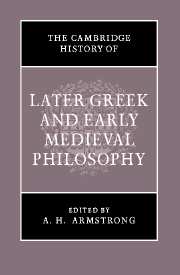Book contents
- Frontmatter
- Chapter 1 Introductory
- Part 1 GREEK PHILOSOPHY FROM PLATO TO PLOTINUS
- Part II PHILO AND THE BEGINNINGS OF CHRISTIAN THOUGHT
- Part III PLOTINUS
- Chapter 12 Life: Plotinus and the religion and superstition of his time
- Chapter 13 Teaching and writing
- Chapter 14 Man and reality
- Chapter 15 The One and Intellect
- Chapter 16 From Intellect to matter: the return to the One
- Part IV THE LATER NEOPLATONISTS
- Part V MARIUS VICTORINUS AND AUGUSTINE
- Part VI THE GREEK CHRISTIAN PLATONIST TRADITION FROM THE CAPPADOCIANS TO MAXIMUS AND ERIUGENA
- Part VII WESTERN CHRISTIAN THOUGHT FROM BOETHIUS TO ANSELM
- Part VIII EARLY ISLAMIC PHILOSOPHY
- Select Bibliography
- Additional Notes and Bibliography
- Index of ancient and medieval works referred to in the text
- General Index
- Index of Greek terms
- References
Chapter 12 - Life: Plotinus and the religion and superstition of his time
from Part III - PLOTINUS
Published online by Cambridge University Press: 28 March 2008
- Frontmatter
- Chapter 1 Introductory
- Part 1 GREEK PHILOSOPHY FROM PLATO TO PLOTINUS
- Part II PHILO AND THE BEGINNINGS OF CHRISTIAN THOUGHT
- Part III PLOTINUS
- Chapter 12 Life: Plotinus and the religion and superstition of his time
- Chapter 13 Teaching and writing
- Chapter 14 Man and reality
- Chapter 15 The One and Intellect
- Chapter 16 From Intellect to matter: the return to the One
- Part IV THE LATER NEOPLATONISTS
- Part V MARIUS VICTORINUS AND AUGUSTINE
- Part VI THE GREEK CHRISTIAN PLATONIST TRADITION FROM THE CAPPADOCIANS TO MAXIMUS AND ERIUGENA
- Part VII WESTERN CHRISTIAN THOUGHT FROM BOETHIUS TO ANSELM
- Part VIII EARLY ISLAMIC PHILOSOPHY
- Select Bibliography
- Additional Notes and Bibliography
- Index of ancient and medieval works referred to in the text
- General Index
- Index of Greek terms
- References
Summary
Plotinus begins a new period in the history of Greek philosophy, but his achievement cannot be described as either a revival or a revolution. As Part 1 has shown, Platonism in the second and early third centuries A.D. was very much alive, and by no means merely stereotyped and superficial: and the thought of Plotinus in many ways continues along lines laid down by his predecessors. But he was an original philosophical genius, the only philosopher in the history of later Greek thought who can be ranked with Plato and Aristotle, and was impelled by a personal mystical experience of a kind and quality unique in Greek philosophical religion. So the result of his critical rethinking of the long and complex tradition which he inherited was a really original philosophy with far greater coherence and vitality than Middle Platonism, and one which had a wide and deep influence on later European thought.
We have only one reliable source of information about the life of Plotinus. It is the Life of his master which Porphyry, his disciple and editor, wrote in the year 301, more than thirty years after he had parted from Plotinus, and prefixed to his edition, the Enneads. This is generally recognized as a work of quite unusual quality, with no parallel among ancient philosophical or literary biographies, and giving a great deal of authentic information. It tells us, however, very little about the early life of Plotinus for the simple reason that Plotinus himself told his disciples next to nothing.
- Type
- Chapter
- Information
- Publisher: Cambridge University PressPrint publication year: 1967



